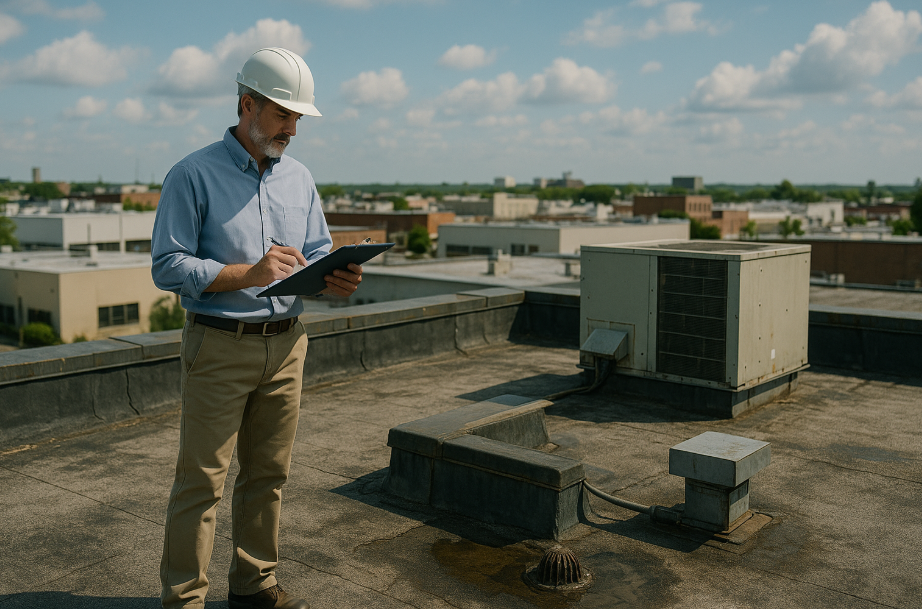Due Diligence 101: Why Roof Inspections Matter Before You Buy Commercial Property
Purchasing commercial property is one of the most significant investments a business owner or investor can make. Whether you’re acquiring an office building, warehouse, or retail center, the due diligence process is crucial. It helps you uncover hidden risks, verify the property’s condition, and ensure you’re making a sound financial decision.
While many buyers focus on location, zoning, or interior features, one of the most overlooked components of due diligence is the roof. Yet the condition of the roof can greatly impact the long-term value and maintenance costs of the property. Skipping a thorough roof inspection could lead to unexpected repairs, insurance complications, and even business disruptions.
The Roof: A Property’s First Line of Defense
Roofs are often “out of sight, out of mind,” but they play a critical role in protecting the entire structure. A failing roof can allow moisture to seep into insulation, damage electrical systems, and compromise structural integrity. The problem is that many roofing issues aren’t visible from ground level—or even during a basic walk-through.
A professional inspection can reveal early signs of deterioration, identify areas needing repair, and help you plan for future replacements. This insight is especially important when you’re deciding whether the property is worth the asking price or if negotiations are in order.
Roof Repairs Aren’t Just Cosmetic—They’re Costly
Replacing or repairing a commercial roof is no small expense. Depending on the size and type of the roof system, costs can easily reach tens or even hundreds of thousands of dollars. If you’re unaware of roof damage at the time of purchase, you could find yourself facing these costs sooner than expected.
Buyers who obtain accurate roofing assessments during due diligence are better positioned to negotiate repairs, request credits, or adjust the offer price accordingly. In some cases, it might even be a deal-breaker—especially if extensive roof replacement is required immediately after purchase.
Water Damage and Mold: Hidden Risks Below the Surface
One of the biggest dangers of an uninspected roof is water infiltration. Even a small, undetected leak can lead to significant interior damage. Moisture can accumulate behind walls, beneath flooring, or in ceiling tiles, creating the perfect environment for mold growth.
Not only is mold remediation expensive, but it can also pose health risks to tenants or employees. If your property is intended for occupancy, undiagnosed water damage can result in liability issues, delayed openings, or costly renovations. Working with professionals experienced in commercial roofing tulsa ok ensures you’re assessing both surface-level and hidden risks.
See also: Stages of Money Laundering: Understanding the Process and Risks
Understanding the Roof’s Life Expectancy and Maintenance History
Roof inspections don’t just identify current problems—they also help assess how much life remains in the existing system. Roofing materials have different lifespans. A flat membrane roof may last 20 years, while metal systems can extend beyond 40 years with proper care.
An inspection will give you an estimate of the remaining service life and whether the roof has been well-maintained. Sellers who have kept detailed maintenance records provide extra assurance, but an inspection is still essential to verify their claims and understand when major expenses might arise.
The Role of Drainage and Structural Design
Drainage issues are one of the most common causes of commercial roof failures. Improper slope, blocked gutters, or failing scuppers can result in water pooling, which accelerates wear and increases the risk of leaks.
During a due diligence roof inspection, professionals assess the drainage system’s functionality and evaluate whether the design is adequate for local weather conditions. If you’re purchasing in an area with heavy seasonal rain, like Oklahoma, drainage issues become a much more significant concern. Working with local experts in commercial roofing tulsa ok helps ensure you’re getting insights tailored to the climate and architectural norms of the region.
How Roof Condition Affects Financing and Insurance
Many lenders require a property condition assessment before finalizing a commercial real estate loan. If the roof is in poor shape, it may affect the terms of your financing—or cause lenders to withhold funding until repairs are made.
Similarly, insurers often want to see inspection reports to determine the level of risk before issuing or renewing policies. A deteriorating roof can raise premiums or trigger exclusions for water-related damage. Having an up-to-date inspection strengthens your financial position and avoids unpleasant surprises during underwriting.
Negotiating Power: Inspections Put You in Control
Information is leverage during a real estate transaction. When you have a professional roof inspection in hand, you gain the ability to make informed decisions and negotiate from a position of strength. Whether it’s requesting repairs before closing, negotiating a lower price, or asking for escrow funds to cover future roof maintenance, your inspection results give you options.
Without this data, you risk accepting responsibility for issues the seller may have been aware of—but didn’t disclose. The inspection protects your investment by ensuring full transparency before any contracts are signed.
Signs That a Roof Inspection Is Urgently Needed
While a roof inspection is always recommended during due diligence, there are certain red flags that make it non-negotiable:
- The roof looks visibly aged or patched in multiple areas
- There are water stains inside the building
- You notice musty odors or signs of mold
- The seller doesn’t provide maintenance records
- The building has been vacant for long periods
Any of these signs should prompt immediate evaluation by roofing professionals familiar with commercial roofing tulsa ok. Acting early can prevent costly missteps and help you avoid inheriting hidden liabilities.
What a Professional Roof Inspection Should Include
A comprehensive commercial roof inspection goes beyond a visual once-over. Key components include:
- Detailed assessment of roofing material condition
- Inspection of flashing, seams, and penetrations
- Evaluation of drainage systems
- Identification of ponding, cracks, or punctures
- Infrared or moisture scanning (if applicable)
- Estimate of remaining roof life
- Cost estimates for repair or replacement (if needed)
The final report should include photos, descriptions, and actionable recommendations. Make sure your inspector is certified, insured, and experienced with commercial buildings in your area.
Roof Inspections Are a Small Price for Long-Term Peace of Mind
When viewed in the context of a real estate transaction, a roof inspection is a low-cost, high-value step. It may cost a few hundred dollars upfront, but it has the potential to save tens of thousands in repairs, prevent future disputes, and give you peace of mind.
Buyers who invest in full due diligence—including roof inspections—are more likely to secure profitable, low-risk properties that stand the test of time. It’s a smart move that reflects professionalism and financial foresight.






